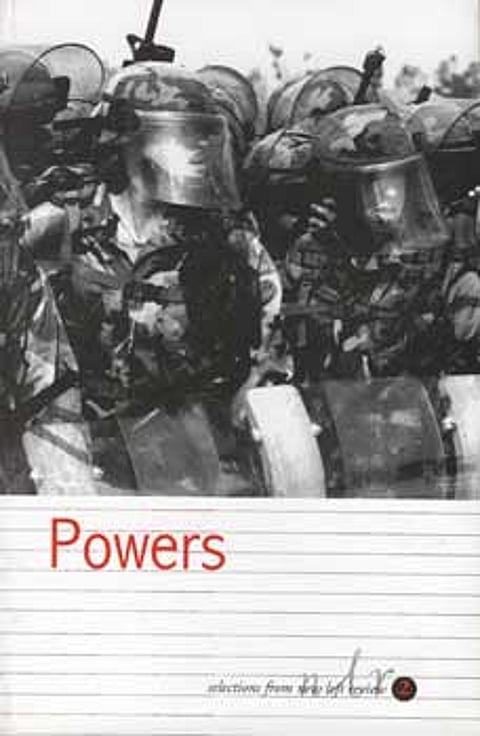Politics, aesthetics and a world of thought


| Selections from New Left Review: I: The Global Stage II: Powers III: Front Lines IV: Other Worlds edited by Susan Watkins Seagull Books, 2006 |
Since its inception in 1960, the London-based New Left Review has been a record of the intellectual journey of the global left. From Jean-Paul Sartre to Edward Said, Achin Vanaik and Radhika Desai, leading left intellectuals from around the world have used the pages of New Left Review to theorise on various subjects, from blockbuster films to the UN's bureaucratic intricacies. Despite the contributions of Southasian intellectuals, however, finding a copy of the journal has long been difficult in the Subcontinent.
Editors from Calcutta-based Seagull Books have now brought out a four-volume series of selections from New Left Review, offering a solid introduction for regional readers to this bastion of left thought and debate. From the 1960s, when a third of the planet had politically turned away from capitalism, to the 1990s, which may be called the decade of neo-liberalism, the agenda of the NLR has remained to respond to and explore changing conjunctures, or the meeting of events, in political discourse.
If the present situation is characterised by the primacy of American capitalism, with Europe aspiring to replicate the American model with doses of placatory anti-American rhetoric, then editor Perry Anderson delineates in the introduction to the first volume what have been the left's two principal responses. The first is accommodation, the attitude summed up by the idea that capitalism has come to stay, and that we must subsequently make our peace with it. The second is consolation, which is understood best as an attempt to find the silver linings in what seems an overwhelmingly gloomy environment. As such, caught in a world where there is a terrifying irrevocability to what is happening both outside and within ourselves, Anderson suggests that readers continue to read NLR for its "uncompromising realism" – its capacity to shock us into seeing the world as a "planet of slums" (to use Mike Davis's words), or into recognising that the UN may "be slotted into the framework of American hegemony as an auxiliary machine" (Peter Gowan).
So does the compilation of articles in Selections live up to the quality of the journal itself? The answer would be in the affirmative. Reading Marxist theorist Frederic Jameson on "Globalisation and Political Strategy" in the first volume, one is struck by the clarity of his approach, especially in confronting amorphous phenomena such as the global dispersion and reception of culture, technology and finance in the 21st century. Jameson deftly breaks globalisation down into its various aspects: the technological (communications and the info-rmation revolution), political (the fate of the nation state), cultural (the rise of nationalist politics) and economic (the US control over the international transfer of capital). Jameson also helps the reader to see the crucial interconnections between all of these. Refreshingly, the arguments are not diluted, even when the discussion is of forms of resistance that may be forged against the homogenising behemoth that is globalisation. Jameson argues for new solidarities, but dismisses the argument that religion – specifically Islam – may be the new site for resistance, arguing that religious solidarity cannot face up to the economic realities of globalisation.
In the same vein, intellectual historian Gopal Balakrishnan's excellent review of Marxist philosophers Michael Hardt and Antonio Negri's bestseller Empire offers a trenchant critique of post-modern fantasies – in this case, of the far left – that indulge in theoretical flourishes but have little to offer by way of a solid narrative of contemporary politics. Some may ask why such banal demands should be made on an academic work. The attempt to unite theory and practice, however, has long been a significant project of the left intellectual tradition. In this regard, Hardt and Negri are correctly chastised for allowing themselves to get so carried away in their celebration of diversity and their faith in post-modern theory that they ignore impending dangers and announce the dawn of a golden age.
Neo-liberal consensus
In the series' second volume, titled Powers, we are treated to a wide-ranging discussion of the world's major political players. Radhika Desai covers the 2004 elections and the subsequent consequences of regime change in India. The US receives a lion's share of the analysis: Perry Anderson, Susan Willis and Robert Brenner focus respectively on aspects of coercion and hegemony, the post-9/11 scenario, and the US economy.
A particularly fine piece, however, is a discussion between the great French sociologist Pierre Bourdieu and the German Nobel Prize-winning writer Gunter Grass, more famous in Southasia for sticking his tongue out at the Bengali bhadrolok. The interview is chiefly concerned with Europe and neo-liberalism, and specifically the relationship between Germany and France. In the course of their debate, Bourdieu and Grass produce an excellent portrait of the contemporary affiliations between intellectuals and the left in Europe. Their prescription for countering the rise of the neo-liberal consensus – comically, each of these great thinkers considers the other utopian – brings the two to agree on a need to transcend national barriers, albeit that Grass feels this can only be done through a return to the rationalist values of the Enlightenment, while Bourdieu emphasises the need for a new type of unionism.
On the whole, this new, four-part selection from New Left Review is an excellent and inexpensive invitation for Southasian readers to think beyond the boundaries of their own activism and thought. The compilation is strongly internationalist in outlook, and there perhaps are no regional titles that can boast of such an eclectic mix of literary theory, politics, philosophy and aesthetics from all parts of the world.
~ Moyukh Chatterjee is a student of psychology at the Delhi School of Economics.

